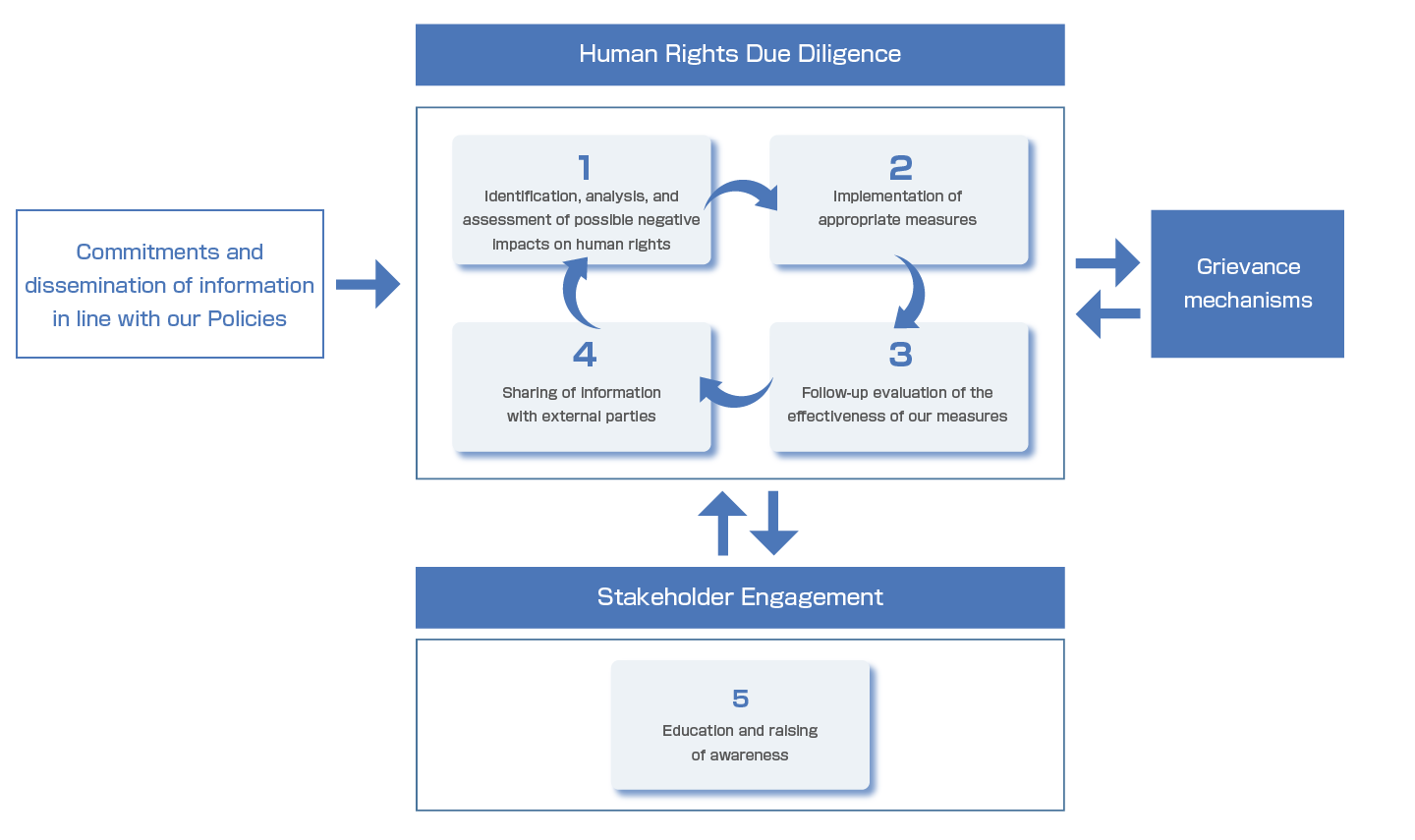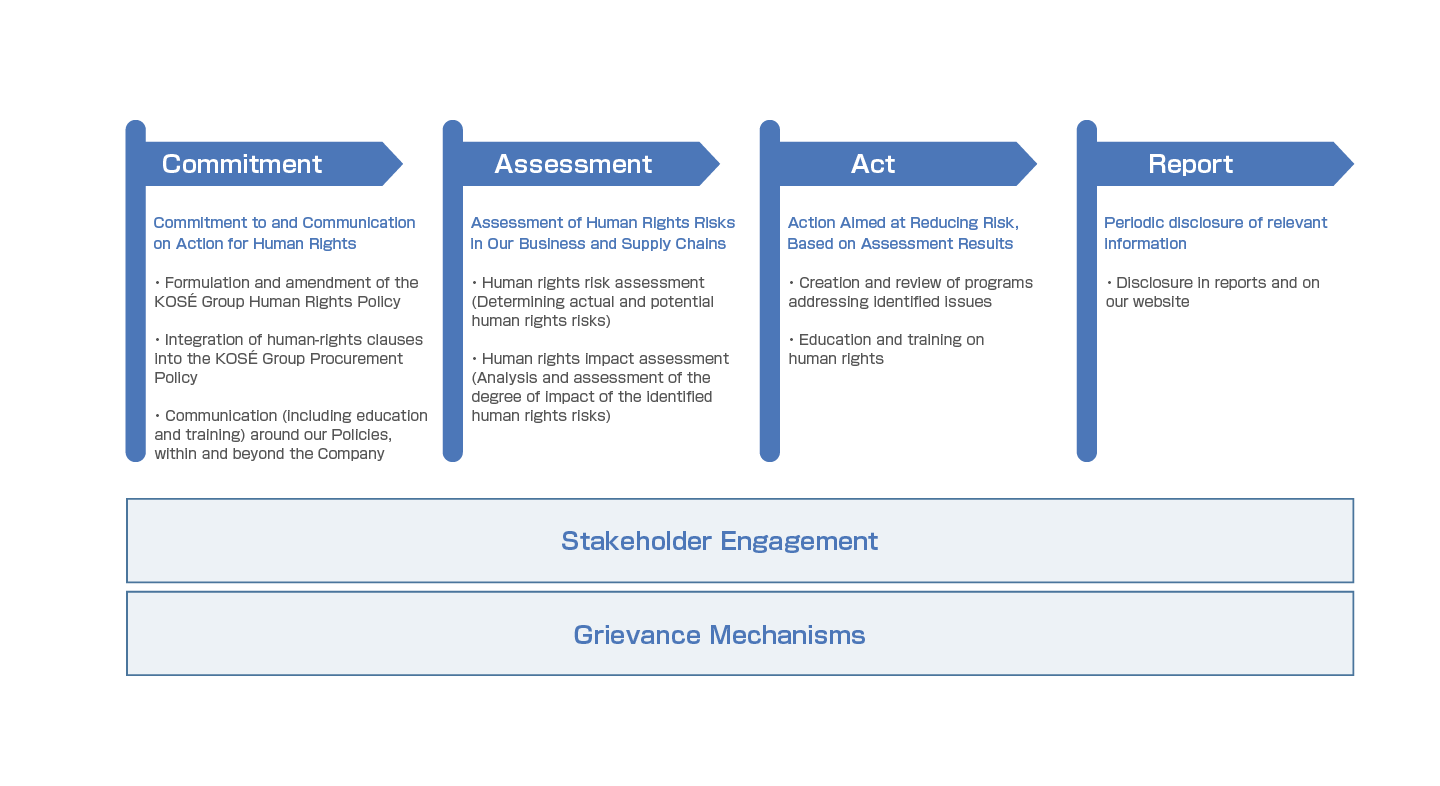Human Rights Due Diligence
Our Human Rights Due Diligence Procedure
The KOSÉ Group is promoting human rights due diligence in keeping with the procedures outlined in the
United Nations’ “Guiding Principles on Business and Human Rights (UNGPs),” and based on the laws and
regulations of each country in which we do business.
This is an ongoing process, guided by the KOSÉ Group Human Rights Policy, in which we (1)
determine possible negative impacts and issues to be addressed, (2) implement appropriate measures,
(3) conduct monitoring and follow-up evaluations, and (4) disclose relevant information, as well as
communicate with external stakeholders.
Human Rights Due Diligence

KOSÉ Group Initiatives, Step by Step

Identification of Possible Negative Impacts on Human Rights and In-House Review of Human Rights Issues
In order to determine possible negative impacts and issues to be addressed—step one of the process
set out by UNGPs— we have been conducting human rights risk assessments (assessments of potential
risks to human rights posed by our business activity) on an ongoing basis since FY2021.
To do this, we have carried out desk research into human rights risks in each of the countries in which the KOSÉ
Group does business and conducted reviews in eight divisions within the Company (including associated Group companies)
of actual and potential human rights risks that could arise in the value chain of our business, using the table of human
rights issues specific to the cosmetics and daily necessities industry published by Caux Round Table Japan (based on the
Human Rights Guidance Tool developed by the United Nations Environment Programme Finance Initiative [UNEP FI]). We have
also used additional interviews with both Japanese and overseas divisions to verify the severity of certain risks and
incorporated social perspectives acquired through discussion with NPOs representing small-scale palm farmers and the
third sector, employee satisfaction surveys, and other engagement with rights-holders. We have also examined the
possibility of actual and potential negative human rights impacts occurring in Japan and overseas, as well as the status
of preventative and corrective measures implemented by the KOSÉ Group in response, and used this information to evaluate
particularly critical human rights issues.
We have examined the value chain of our business at every step, from research, planning, and development, to
procurement, production, logistics, offices, public relations and advertising, sales, (customers’) use of our products,
and wastage. We consider external supply chains, employees at KOSÉ Group facilities (regardless of employment status),
customers, and wider society (including indigenous people, local residents, immigrants, and others living near our
facilities) to be rights-holders with the potential to have an impact. We have established (1) gender, including LGBTQ+
and women, (2) working conditions, (3) race and nationality, including religious and cultural background, (4) safety,
including hygiene, and (5) other (environment and living conditions, disability status, age, work experience, etc.) as
our human rights metrics.
In FY2022, we expanded our risk assessment framework and carried out assessments at all KOSÉ Group operating bases
(47 bases and divisions), alongside a survey using our Human Rights Self-Assessment Checklist (Response rate: 100%).
This qualitative survey allows us to ascertain the different human rights risks and countermeasures arising due to
unique factors in each of our bases and businesses. This data is consolidated and used in the ongoing implementation of
our governance structure for the management of potential risk from a short- to medium-term perspective.
An Overview of Possible Negative Impacts of the KOSÉ Group on Human Rights (Identified Internally)
| Potential Negative Impacts on Human Rights | Human Rights Metrics | Our Value Chain and Rights-Holders | ||
|
External Supply Chain (Suppliers, production & logistics contractors, etc.) |
KOSÉ Group Facilities (Research, production, internal distribution, offices, sales and marketing sites, etc.) |
Wider Society (Communications, website & public relations, customers’ use of our products, etc.) |
||
| Employees of our business partners, residents of areas in near their facilities | Employees, residents of areas near our facilities, recruiters | Average consumers, our customers | ||
| Gender |
|
|
|
|
| Working Conditions |
|
|
– | |
| Race & Nationality |
|
|
|
|
| Safety |
|
|
|
|
| Other |
|
|
|
|
 |
||||
| Key Group Initiatives |
■ Basic Procurement Policy and Sustainable Procurement Guidelines ■ Initiatives aimed at our suppliers
■ Support for sustainable palm oil
|
■ Promotion of diversity & inclusion
■ Initiatives for meeting compliance requirements
■ Promoting attention to occupational hygiene and Health & Productivity Management |
■ Provision of products, public relations, and services tailored to our diverse customers
|
|
| Complaints Processing Mechanisms |
|
|||
As a result of our assessments, we have identified two particularly salient human rights issues for the KOSÉ Group:
continuously ascertaining human rights issues in the raw materials procurement supply chain, and diversity and
inclusion in the Company and human rights in the workplace. In the former area, our assessments showed that
continuous monitoring for human rights violations in the category of working conditions—such as forced or child
labor—is particularly vital in supply chains connected with the development of oil palm plantations. We made this
judgment based on our extensive use of palm oil derivatives in our cosmetics, the large scale of the impact that the
unlikely event of a human rights violation would have on rights-holders, and the high risk that any such incident
would be reported on or otherwise documented in the international community, among other factors. The issue of
diversity and inclusion in the Company and human rights in the workplace was selected as a key issue due to the fact
that we judged employee awareness to be high around preventing harassment, promoting active roles for women, and
compliance in general, but Company education and awareness-raising on gender and sexual diversity (LGBTQ+) to be
lacking. While we have confirmed that the KOSÉ Group has no employees taking part in the Specified Technical Intern
Training Program, our judgment on this issue was also informed by the fact that raising the level of employee
awareness around diverse nationalities and cultures and improving human rights awareness will become increasingly
important going forward as we globalize our business. We additionally identified promoting communication of
information and responses (public relations, advertising, customer service, product explanations, etc.) that keep
diversity in mind as an important factor in allowing us to have a positive impact on society through our respect for
human rights. For all of these issues, a third-party organization specializing in human rights risk assessment
provides an objective evaluation of the suitability of the KOSÉ Group’s process for determining human rights risks
and the status of our initiatives, with a particular focus on issues we should address.
Going forward, we will continue to conduct regular annual reviews to ascertain the risk and nature of human rights
issues potentially arising in our value chain, determine critical human rights issues, and implement appropriate
measures to counteract these identified issues on an ongoing basis.
Top Priority Human Rights Issues and Risk Management
For each of our identified priority human rights themes, we are advancing the risk management measures listed below.
| Identified Human Rights Theme | Status and Response Measures |
| Continuously ascertaining human rights issues in the raw materials procurement supply chain |
|
| Diversity and inclusion in the Company and human rights in the workplace |
Risk management and compliance awareness-raising activities |
| Promote the communication of information and our responses (public relations, advertising, customer service, product explanations, etc.) with diversity in mind |
|
*Sedex(Supplier Ethical Data Exchange)
Sedex is the world’s largest cooperative platform for buyers and suppliers to share and confirm information regarding labor practices, health and safety, the environment, and business. It was established to promote ethical and responsible business practices in global supply chains.
Third-Party Opinion
As we advance our human rights due diligence, our initiatives to promote respect for human rights consider not only KOSÉ Group perspectives but also emphasize viewpoints from wider society. We conduct our human rights risk assessments with the collaboration of the Caux Round Table (CRT) Japan.

Hiroshi Ishida
Executive Director of CRT Japan

Hiroshi Ishida
Executive Director of CRT Japan
Human Rights Due Diligence Initiatives
I confirm that the KOSÉ Group has recently conducted human rights due diligence and risk assessments, based on UNGPs and with the involvement of relevant departments and third-party organizations, which identified human rights issues along the Company’s value chain with the potential to have significant negative effects on society.
Going forward, I hope to see the KOSÉ Group determine salient human rights issues through direct dialogue with others, respond to these issues, and facilitate expansion and use of its current grievance mechanisms involving its supply chains.
Sustainability promotion structure
Human Rights Policy and Promotional Structure
Human Rights Due Diligence
Respect for Human Rights
Diversity & Inclusion
Together with Our Employees
Supply Chain Management
About our internal reporting system